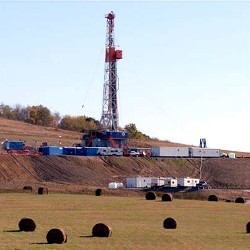A new report by researchers at Duke University in Durham, North Carolina outlines health and environmental measures for lawmakers in that state to consider as they debate the use of horizontal drilling and hydraulic fracturing for natural gas. The study has been accepted for publication in the spring 2012 issue of the journal Duke Environmental Law and Policy Forum.
As the report notes, a 2009 geologic survey found reserves shale gas under 12 counties in North Carolina. Hydraulic fracturing — known by the shorthand term fracking — is a technique to access and extract natural gas found in otherwise impermeable shale rock.
Current North Carolina law, however, prohibits both horizontal drilling and the injection of waste into wells, including hydraulic fracturing fluids, creating a de facto ban on hydraulic fracturing. In June, the state’s governor signed a law directing the state’s environmental authorities to study and hold hearings on the technique.
In the report, a team from Duke’s Nicholas School of the Environment looks at potential environmental hazards and reports on ways lawmakers in other states take health and environmental risks into account in their regulations of the natural gas extraction method. The study recommends seven sets of measures to help avoid and mitigate fracking’s adverse affects:
- Develop baseline data on groundwater prior to shale gas production and at each stage of the drilling process
- Secure funding for regulatory programs and an agency to carry them out
- Plan for withdrawals from area water supplies needed for production
- Implement safety requirements to minimize risks of spills and contamination caused by equipment failure and human error
- Develop and calculate the consequences of options for the disposal and treatment of wastewater resulting from hydraulic fracturing
- Assess the effects of hydraulic fracturing on air quality and assure federal ground-level ozone standards are being met
- Require operators to disclose the chemicals used in fracturing fluids
Fracturing fluid, notes the report, can contain up to 99% water, but also chemical additives and propping agents. Those added chemicals include friction reducers, surfactants, gelling agents, scale inhibitors, pH-adjusting agents, corrosion inhibitors, antibacterial agents, and clay stabilizers.
Because current law prohibits use of hydraulic fracturing, says the report, the state has an opportunity to gauge the full impact of the technique, thus the importance of developing the baseline data indicated in the first recommendation.
Read more:
- University to Study Fracking and Methane in Drinking Water
- Study: Hydraulic Fracturing Can Release Uranium from Shale
* * *


 RSS - Posts
RSS - Posts
[…] Read more: Study Outlines Regulatory Issues for Natural Gas Fracking […]